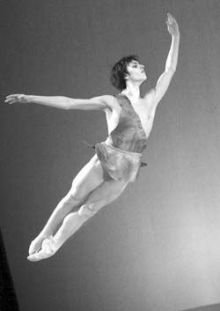For a week dancers and choreographers from 15 countries vied during the 6 th Lifar International Ballet Competition. On Sunday the jury led by the noted choreographer Yuri Grigorovich passed their verdict: the Grand Prix (a figurine of flying Icarus) was conferred on no one and only winners in various standings were named.
According to the jury, all dancers performed evenly in the Ballet Artist nomination (in the junior and senior groups), but there were no obvious leaders. This made the jury count the points very carefully as winners were at times determined by hundredth parts of points. For the first time the third prize in the senior women’s group was shared by five (!) contenders and the first prize went to the National Opera’s soloist Natalia Matsak. The ballet buffs enjoyed the performance of Kateryna Khaniukov, 1st year student at Kyiv Choreography College (she placed first in the junior group), and the competition’s discovery was the original dancer Serhiy Polunin. He represented Kyiv’s ballet school and is perfecting his skill at the Royal Academy of Dance in London. Pysarev’s ballet school in Donetsk reaffirmed its good reputation as its graduate Yevhen Lahunov (currently a soloist with the National Opera of Ukraine) won first place in the senior group. The Japanese dancer, Ioshito Kinoshita, left a very good impression, placing third. This dancer from Kyoto became a soloist with Donetsk Opera and Ballet Theater after graduating from Kyiv Choreography College. Yuri Grigorovich pointed out that this Lifar Competition was another proof that the Ukrainian ballet school is in the lead, not only in the former Soviet republics, but elsewhere in the world. He reminded those present that Ukrainian dancers won eight awards, including the Grand Prix, during last year’s competition in Moscow. Incidentally, it was won by Denys Matviyenko who now performs in Kyiv, St. Petersburg, and Moscow. Two weeks ago the Bolshoi premiered a restored version of The Golden Age starring Matviyenko. Grigorovich added that “the names discovered during this Lifar Competition will more than once gladden the hearts of ballet devotees with their skill.”
Compared to last year’s, this competition was dominated by female dancers, The Day was told by Vadym Pysarev, member of the jury, artistic director of the Solovianenko Opera and Ballet Theater of Donetsk. “In the senior group everyone danced evenly, every pas looked the same, so I suggested that the third prize be shared by five dancers: Irina Kosheleva, Anastasia Lomanchekova (Russia), Kristina Balaban (Moldova), Kateryna Kozakova, and Nina Zmiievets (Ukraine). The male dancers’ performance looked less impressive than in previous years. There was no obvious leader, although I was very impressed by Serhiy Polunin (gold medal in the junior group). I am sure that he will become a ballet star before long.”
The first and the second prize were not awarded. The jury conferred the third prize only on Oksana Galkina (St. Petersburg) for her funny number “One Day Before Our Era.” Consolation prizes (diplomas) were awarded to ex-Kyivans Liudmyla Vasylieva, Yaroslav Ivanenko, Maxym Skliar (they are currently working in Slovakia) and Freedom Ballet soloist Ksenia Streltsova (Kyiv).
The organizers promised that next year the National Opera of Ukraine will have another ballet from the legacy of our legendary fellow countryman, Mirages. Serge Lifar’s dream about his ballets being performed in his native land is gradually becoming a reality. This year Lifar’s pupil Olivier Pate staged the
Morning Serenade in Kyiv. There were suggestions of including Lifar’s choreography into the competition’s compulsory program (it is currently performed by only three dancers). Then it would stand to logic that the choreographer’s widow Lillian Ahlefeldt-Laurvig’s special prize “For the Implementation of Serge Lifar’s Choreography” should be awarded to the best contenders who have mastered Lifar’s neoclassic style. This year the prize was conferred on the National Opera’s soloists Tetiana Holiakova and Andriy Hura for their leading parts in the Early Serenade. Incidentally, the company’s repertoire includes Lifar’s Suite in White and Romeo and Juliet, except that these ballets are very seldom staged.
December 15 this year will mark Serge Lifar’s 20th death anniversary. Yuri Grigorovich noted that “the choreographer continues to live in his ballets, his pupils, and in our memory.” Symbolically during the closing ceremony a recording was played for the first time, made in Lausanne two months before Lifar’s death. Serhiy Mykhailovich considered himself Ukrainian and never accepted French citizenship. He was buried in Paris and the legend on the tombstone is laconic: “Serge Lifar from Kyiv.”







